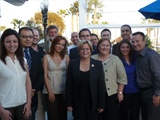Baku. Elnur Mammadli – APA. Musavat Party made a statement on the talks held on reopening of Turkey-Armenia borders, the party’s press service told APA. The statement expresses concern over Turkey’s establishing relations with Armenia and notes that unilateral reopening of borders is inadmissible.
“Turkey’s paradoxical step towards Armenia, which does not give up territorial claims and genocide claims, will not have positive influence on its national interests, regional development or solution to Karabakh conflict. The developments may damage the relations of Turkey with its ally, friend, brother Azerbaijan,” he said.
The party notes that some forces may take advantage of the problem in Turkey-Azerbaijan relations. Musavat calls on Turkish government not to give grounds to the forces interested in damaging friendship between the two countries.
“Musavat Party, which is concerned over the state of Turkey-Azerbaijan relations, calls on politicians and media to be more delicate. We believe that Turkey-Azerbaijan relations will stand the test and strengthen,” the statement says.
Azerbaijan National Independence Party in its statement expresses concern over the discussions on the reopening of the borders. The party considers that the reopening of borders will not establish peace and welfare in thee region, but create serious obstacles in the settlement of the conflicts.
“Reopening of the borders will pave the way for Armenia’s militarism policy and new territorial claims,” the party says.
The party considers that being strategic ally and friend Turkey should take into account Azerbaijan’s interests.
“Reopening of the borders will damage the Turkic world and Azerbaijan-Turkey relations,” the statement says.
Azerbaijan National Democratic Party also made a statement. The party says if the borders will be reopened, Armenian-Russian military-aggressive base will strengthen. The party notes that realization of this probability will mean great political victory of Armenia, damage the national interest of Azerbaijan and Turkey, impede peace, Turkic world project.
“The party blames Turkish authorities for the project of anti-Turkish forces like the reopening of Turkey-Armenia borders. AKP government is executing anti-Turkish policy of Armenians, Persians, Russians and West,” he said.




 According to the US-Azerbaijani Committee, on April 6 representatives of Azerbaijani and Turkish community of California met with representatives of the Republican party from Florida, that is a high-ranking member of the committee of foreign affairs of the US congress, as well as member of Turkish cocus in the Congress Ileana Ros-Letinen, according to the press release, received from these organizations Tuesday.
According to the US-Azerbaijani Committee, on April 6 representatives of Azerbaijani and Turkish community of California met with representatives of the Republican party from Florida, that is a high-ranking member of the committee of foreign affairs of the US congress, as well as member of Turkish cocus in the Congress Ileana Ros-Letinen, according to the press release, received from these organizations Tuesday.
